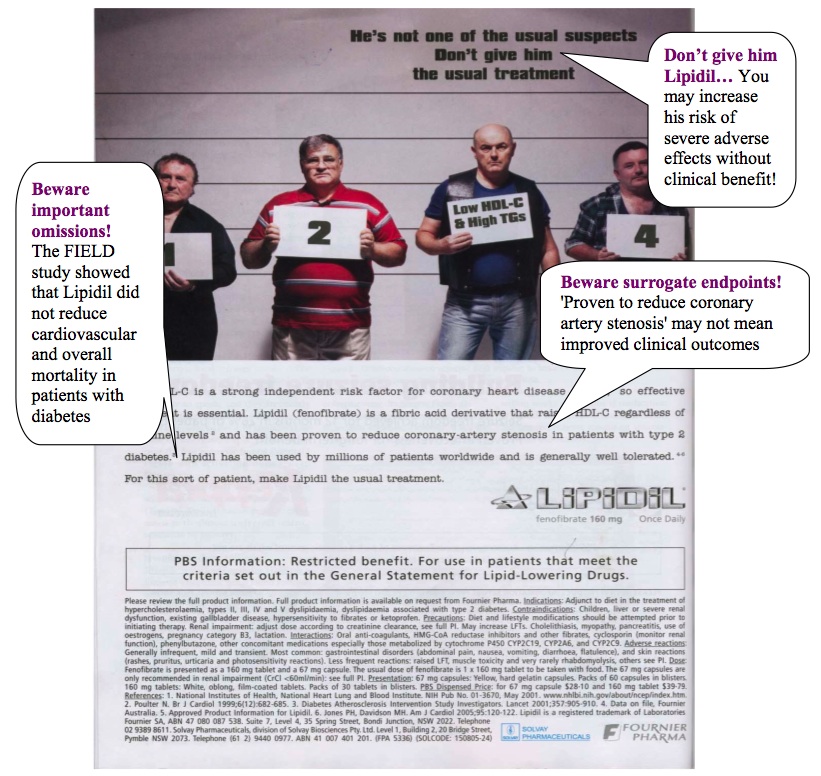Healthy Skepticism AdWatch
AdWatch illuminates the logical, psychological and pharmacological techniques used in drug advertisements.
July 2006, Australia
Lipidil (fenofibrate) from Solvay/Fournier
'Don't give him the usual treatment'.

Lipidilâ„¢ (fenofibrate) is a member of the fibrate class of lipid level modifying drugs. It is registered in Australia for the treatment of dyslipidaemia and hypercholesterolemia. This advertisement, published in the April 2006 issue of Medicines Today (Australia), could be interpreted as promoting Lipidilâ„¢ as ‘usual treatment’ for people with type 2 diabetes.
Beware surrogate endpoints!
Solvay/Fournier, the drug company that markets Lipidilâ„¢ in Australia, claims that Lipidilâ„¢ ‘has been proven to reduce coronary artery stenosis in patients with type 2 diabetes’, based on a study published in 2001 in The Lancet.[1] In this double-blind trial, 731 patients with type 2 diabetes were randomly assigned fenofibrate (200 mg/day) or placebo for at least 3 years. The extent of coronary stenosis was assessed by angiograms at the beginning and end of the trial. The fenofibrate group showed a significantly smaller increase in percentage diameter stenosis than the placebo group and a significantly smaller decrease in minimum lumen diameter, but the trial was not powered to examine clinically important endpoints such as heart attacks.
Coronary stenosis is a surrogate endpoint for coronary events. Surrogate endpoints are physiological, biochemical, radiological or other outcome measures distinct from ‘clinically important’ endpoints. Clinical trials evaluating surrogate endpoints require smaller sample sizes and can often be completed in weeks or months rather than years. However, using surrogate endpoints can lead to incorrect conclusions[2]. For example, post-menopausal hormone replacement improved a surrogate endpoint - lipid levels - and this change misled people to falsely believe that these hormones would reduce a clinically important endpoint - heart attacks.[3]
Omission of the most relevant information!
There is no mention in the advertisement of the Fenofibrate Intervention and Event Lowering in Diabetes (FIELD) study which was published in the Lancet in November 2005.[4] This randomised double-blind controlled trial assessed the efficacy of fenofibrate (200 mg/day) versus placebo in 9795 people with type 2 diabetes. Only 22% had previous cardiovascular disease. After 5 years, there was no statistically significant difference between fenofibrate and placebo in terms of total mortality (7.3% for fenofibrate versus 6.6% for placebo), coronary mortality (2% in both groups), coronary events (6% for fenofibrate versus 5% for placebo).
Severe adverse effects were reported more frequently with fenofibrate (0.8% versus 0.5% for placebo), in particular more pancreatitis, pulmonary embolism and deep vein thrombosis. The Medicines Australia (2002) Code of Conduct prohibits misleading by omission (p. 12).[5]
Are all fibrates equivalent?
In 2003, Lipidilâ„¢ was listed on the Australian Schedule of Pharmaceutical Benefits. The basis for this decision was that its lipid-modifying effect was comparable to that of another fibrate, gemfibrozil, i.e. there is a class effect common to all fibrates. However, unlike fenofibrate, gemfibrozil has been shown to reduce coronary mortality in patients with previous coronary disease.[6]
We have written to the Chair of the Pharmaceutical Benefits Advisory Committee, to ask the Committee to remove Lipidilâ„¢ from the list of drugs that are subsidised by the Australian Government.
Statins are considered first-line treatment for people with diabetes.[7] The FIELD study has shown that fenofibrate does not provide a safe and effective alternative to statins. Fenofibrate has no place in the prevention of cardiovascular disease in patients with diabetes.


1 Effect of fenofibrate on progression of coronary-artery disease in type 2 diabetes: the Diabetes Atherosclerosis Intervention Study, a randomised study. Lancet. 2001 Mar 24;357(9260):905-10. PubMed
2 Fleming, T. R. & DeMets, D. L. Surrogate end points in clinical trials: Are we being misled? Ann Intern Med. 1996;125(7):605-13. PubMed
3 Fugh-Berman A, Pearson C. The overselling of hormone replacement therapy. Pharmacotherapy. 2002 Sep;22:1205-8. PubMed
4 Keech A, Simes RJ, Barter P, Best J, Scott R, Taskinen MR, et al.; FIELD study investigators. Effects of long-term fenofibrate therapy on cardiovascular events in 9795 people with type 2 diabetes mellitus (the FIELD study): a randomised controlled trial. Lancet. 2005 Nov 26;366(9500):1849-61. PubMed
5 Medicines Australia. Code of Conduct. 14th ed. Deakin ACT (Australia): Medicines Australia; 2002. Link
6 Rubins HB, Robins SJ Collins D. Nelson DB, Elam MB, Schaefer EJ, et al. Diabetes, plasma insulin, and cardiovascular disease: subgroup analysis from the Department of Veterans Affairs high-density lipoprotein intervention trial (VA-HIT). Arch Intern Med. 2002;162(22):2597-604. PubMed
7 Costa J, Borges M, David C, Vaz Carneiro A. Efficacy of lipid lowering drug treatment for diabetic and non-diabetic patients: meta-analysis of randomised controlled trials. BMJ. 2006;332(7550):1115-24. PubMed
Indexes:
AdWatch (Australia)
Page views since 15 March 2010: 12221
Comments
Our members can see and make comments on this page.


